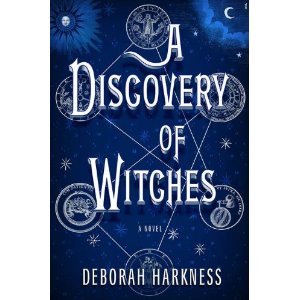
book and had it delivered on the release date. Based on the description and the beautiful cover, I couldn’t wait to crack that spine (figuratively speaking, I’m too neurotic about books to actually crack a spine for real). I started reading it the day it arrived. The fact that I’m still struggling to finish it 11 days later should be telling, especially since I usually can finish a great book in about a day.
I wanted to love this book. The premise sounded so promising. Dr. Diana Bishop, descendant of the very first woman murdered during the Salem witch trials, is reluctant to use her magic, choosing instead to earn her success. The fact that her parents were also murdered when she was only seven adds to her desire to lock up all her power deep inside. But while studying historical alchemical manuscripts at Oxford, she accidentally unlocks a book that may hold all the secrets to the creation of vampires, witches and daemons. Word gets around that she managed to break the spell, and all these creatures start coming out of the woodwork, including Matthew, a 1500 year old vampire. From there, your guess as to the plot line is a good as mine, because the original premise gets so lost along the way I’m not even sure why she bothered mentioning the manuscript in the first place, since we haven’t seen it again in over 300 pages.
Diana, the main character, starts out so likable, even if she is a little too much into exercising for my lazy butt. She’s highly intelligent, a little uptight but also full of self-deprecating humor. Sadly, once she meets the vampire, she becomes a driveling mess of a woman, with no sign of that doctorate-level intelligence after about the 100th page. She meets Matthew, and what could have been a great fantasy about a mysterious alchemical manuscript, the mysteries of the past and an origins story for strange creatures becomes little more than a Harlequin romance. Diana, so strong and independent in the first chapters, finds herself saying “I understand why I have to do everything you say” to her vampire boyfriend by the middle of the book.
The abrupt departure from one setting to another is jarring. Without giving too much away for those who actually want to read the book, one minute she’s preparing for a keynote speech and class lectures in Oxford, and the next she’s letting herself be whisked away to France indefinitely. Seemingly key characters introduced early on all but vanish for most of the book. Harkness, who apparently runs a very popular wine blog, makes sure we know how much she knows about wine by waxing philosophical about the beverage every chance she gets, but by the third time, it comes across feeling like filler text.
I’ll give her this, she writes in a very mellifluous style most of the time. Unfortunately, a beautiful flow cannot conceal major flaws in character and plot. I loved how she interspersed various historical facts. I wish she would have focused more on that and less on the romance aspect. It could have been a great book if she had eliminated most of the middle. Instead, it’s left me struggling, wanting to finish but not quite holding my attention long enough to read more than a chapter at a time. I’m sad, because like I said, I really wanted to love this book. If you’re looking for another “forbidden romance between vamp and non-vamp” book though, you’ll like this one. But if you’re thinking of picking this up because you want something completely different than the usual vampire fare, look elsewhere.


